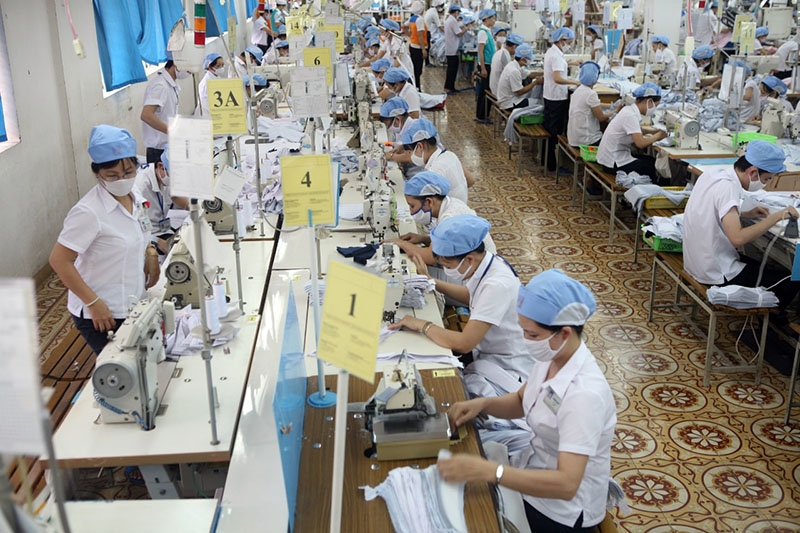Textile and apparel sector yearning for government support to curtail COVID-19 impacts
 |
| The textile and apparel sector warns the pandemic could undermine mid-term development prospects |
Vu Duc Giang, chairman of the Vietnam Textile and Apparel Association (VITAS) said that the sector is facing unprecedented times as businesses accounting for 62 per cent of the textile and apparel sector’s total export value has to suspend production to prevent the spread of COVID-19.
After a while of exercising the "stay at work" scheme, many of these firms could no offset the escalating costs of maintaining business through much-reduced productivity.
“Several firms with dozens of production plants had to stop production. Only fibre and textile dyeing firms which use less workers and more machinery could maintain effective operations through the scheme, while the more labour-intensive apparel industry found itself quickly out of its depth,” said Giang.
Supply disruption in southern locations have been posing mounting challenges to the entire textile and apparel industry, particularly due to intense pressure to deliver orders on time to foreign partners.
Giang noted that in the fashion industry if products are not delivered at the right time, they can quickly lose their value. If local firms failed to deliver their products in time they could suffer significant damage as they would incur contractual fines and lose customer trust.
“Maintaining production in August is extremely hard for the textile and apparel sector as Ho Chi Minh City and 18 other southern localities continue to apply stringent measures under Directive No.16/CT-TTg to contain the pandemic. This will certainly impacts delivery timlines,” said a VITAS source.
The latest figures from the Ministry of Industry and Trade (MoIT) showed that the impact of many southern production plants suspending production due to COVID-19 were instantly seen in the July industrial production index. Accordingly, the index dropped 19.4 per cent for Ho Chi Minh City, 14.6 per cent for Long An province, and 13.7 per cent for Ca Mau.
While many production plants in southern industrial parks had to suspend production, those in Bac Giang and Bac Ninh in the north – the epicentre of the COVID-19 outbreak this late April – have resumed production but are drastically short on hands. These plants are also facing a shortage of production materials.
Luong Van Thu, chairman and general director of Dap Cau Garment JSC, a big player in the northern region, said that after resuming production at three plants in late June, they have been unable to man all production lines while expenditures have been skyrocketing due to periodical COVID-19 testing and rising logistics costs.
The textile and apparel sector raked in nearly $19 billion in total export value in the first half, roughly half of the full-year target of $39-39.5 billion outlined in the best-case scenario. However, Giang from VITAS shared that if the pandemic situation would last for several months, the sector could achieve around $32.5-33 billion in total export value for the full year.
| VITAS forecast lasting damage from the pandemic, with only about 60-65 per cent of workers returning after the pandemic. |
More critically, if supply chains remain disrupted and the Vietnamese market remains unstable, foreign customers would shift orders elsewhere, damaging medium-term development prospects.
Additionally, VITAS forecast lasting damage from the pandemic, with only about 60-65 per cent of workers returning after the pandemic. The ensuing labour deficiency would badly impact labour productivity.
Recently, four professional associations – VITAS, Vietnam Leather, Footwear and Handbag Association (LEFASO), Vietnam Electronic Industries Association (VEIA), and Ho Chi Minh City Handicraft and Wood Industry Association (HAWA) – said that they have found vaccine sources and requested government support in completing import procedures to vaccinate their labourers.
The American Apparel and Footwear Association (AAFA) has also called for the US administration to donate more vaccines to Vietnam, helping to preserve apparel and footwear supply chains, avoiding the devasting impacts of current complex COVID-19 situation in Vietnam’s southern locations.
However, Giang from VITAS noted that the current pace of vaccination in the textile and apparel sector is still slow. Only a few businesses based in Ho Chi Minh City reported that their workforce have got their shots while workers in the remaining 18 southern localities were still waiting.
“Textile and apparel, footwear, and seafood are making great contributions to Vietnam’s export performance and creating jobs for dozens of millions. The government, should consider giving priority in vaccination for the sectors making large contributions, helping them reboot production at the soonest,” said Giang.
What the stars mean:
★ Poor ★ ★ Promising ★★★ Good ★★★★ Very good ★★★★★ Exceptional
Related Contents
Latest News
More News
- Kurz Vietnam expands Gia Lai factory (February 27, 2026 | 16:37)
- SK Innovation-led consortium wins $2.3 billion LNG project in Nghe An (February 25, 2026 | 07:56)
- THACO opens $70 million manufacturing complex in Danang (February 25, 2026 | 07:54)
- Phu Quoc International Airport expansion approved to meet rising demand (February 24, 2026 | 10:00)
- Bac Giang International Logistics Centre faces land clearance barrier (February 24, 2026 | 08:00)
- Bright prospects abound in European investment (February 19, 2026 | 20:27)
- Internal strengths attest to commitment to progress (February 19, 2026 | 20:13)
- Vietnam, New Zealand seek level-up in ties (February 19, 2026 | 18:06)
- Untapped potential in relations with Indonesia (February 19, 2026 | 17:56)
- German strengths match Vietnamese aspirations (February 19, 2026 | 17:40)

 Tag:
Tag:

























 Mobile Version
Mobile Version